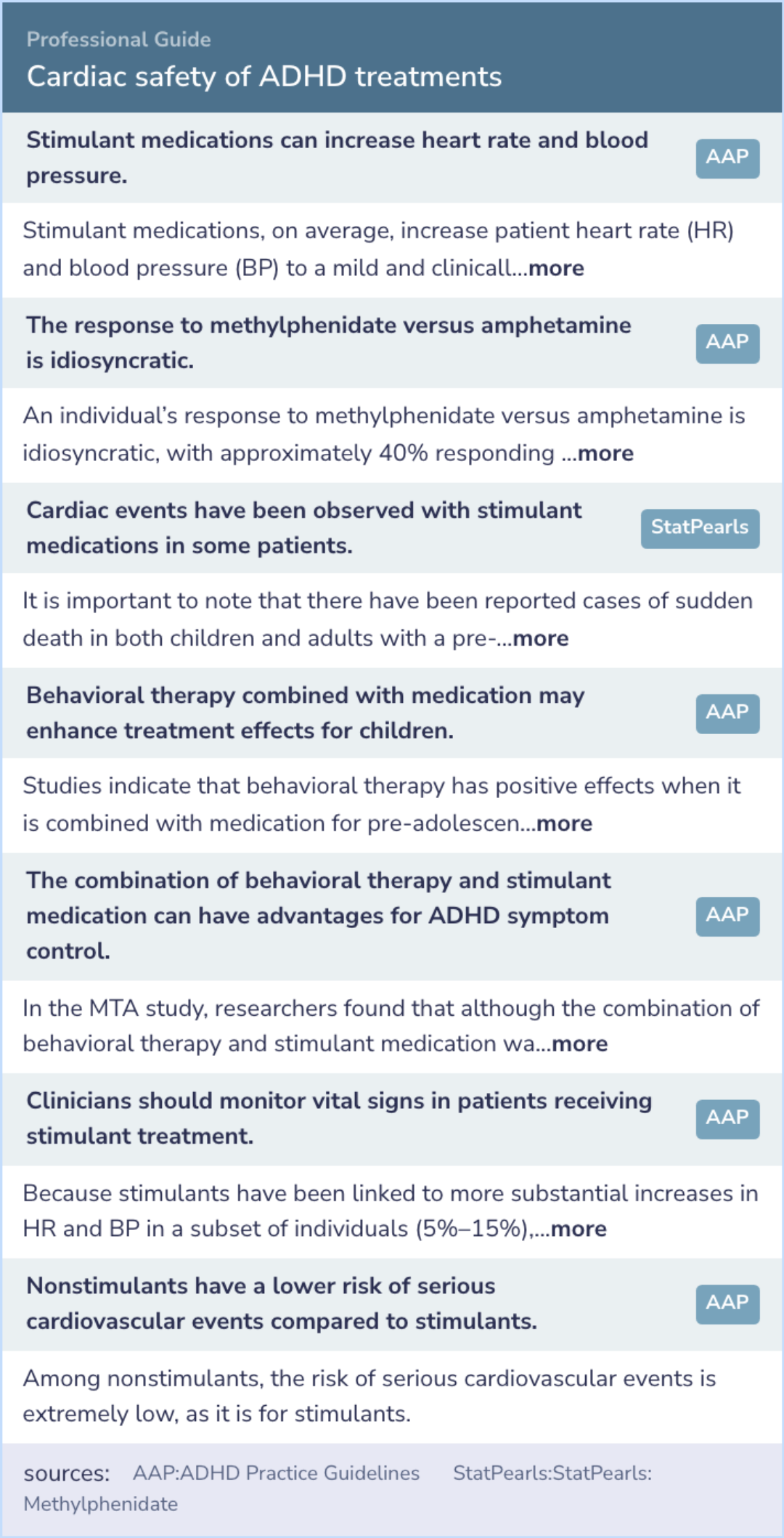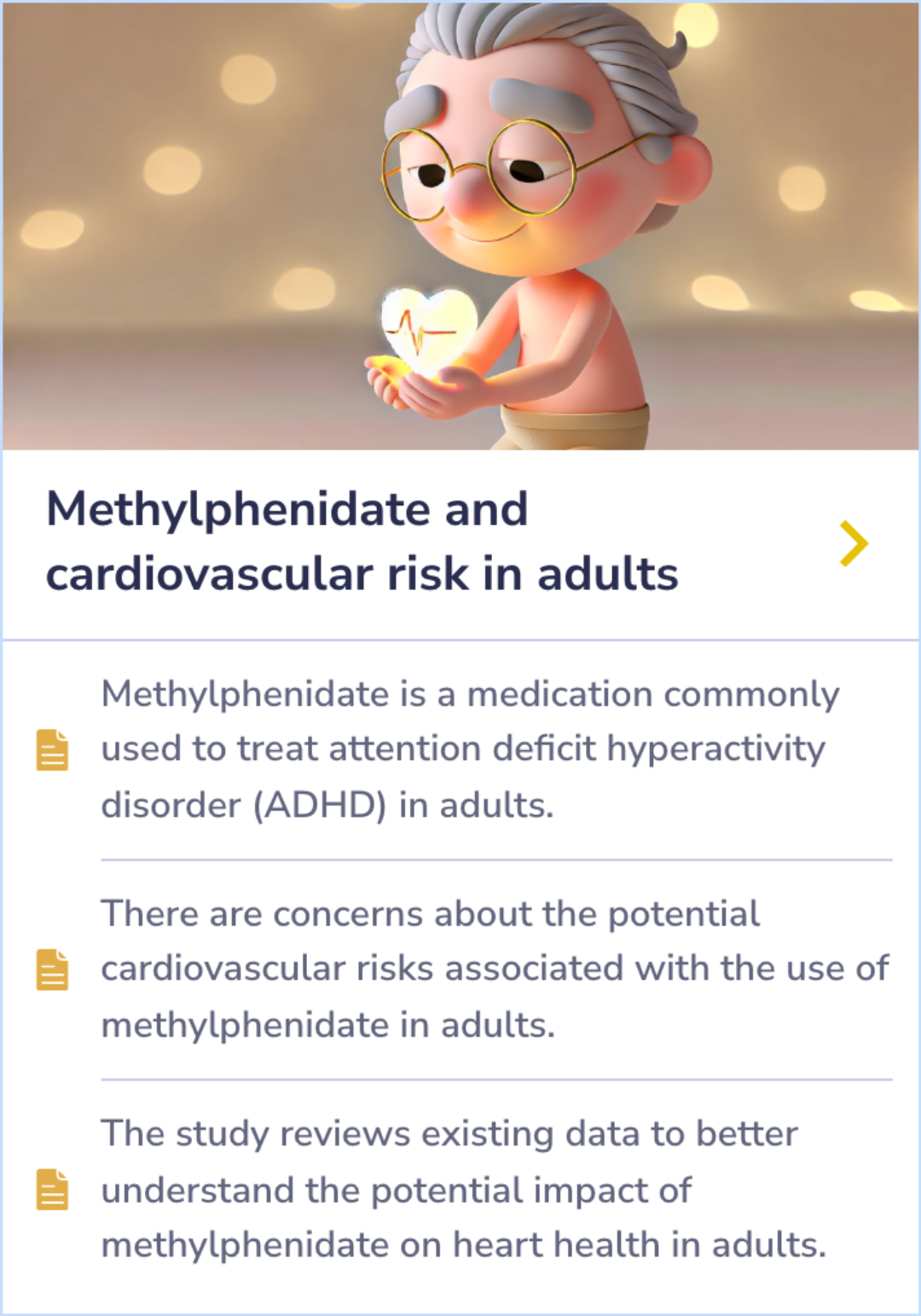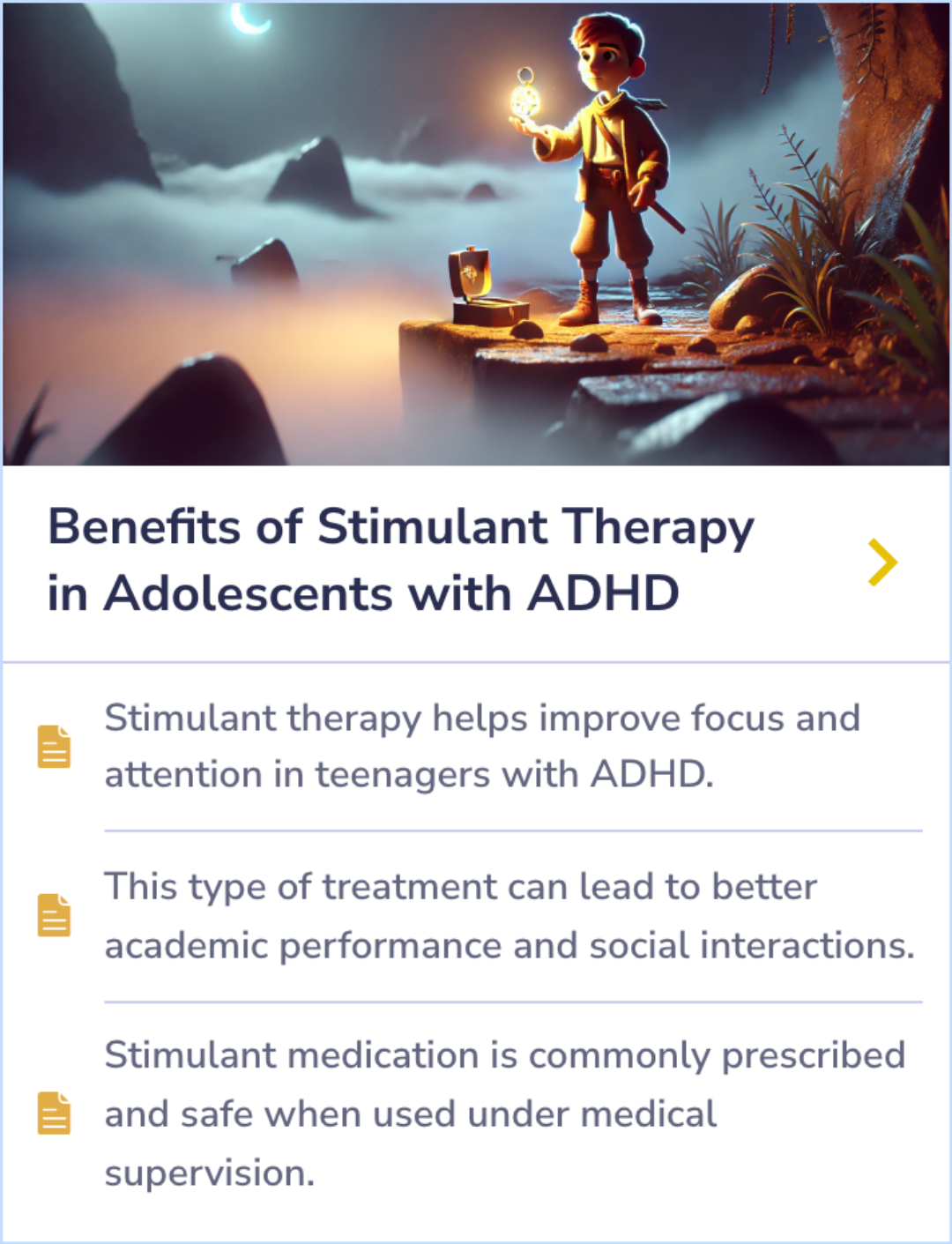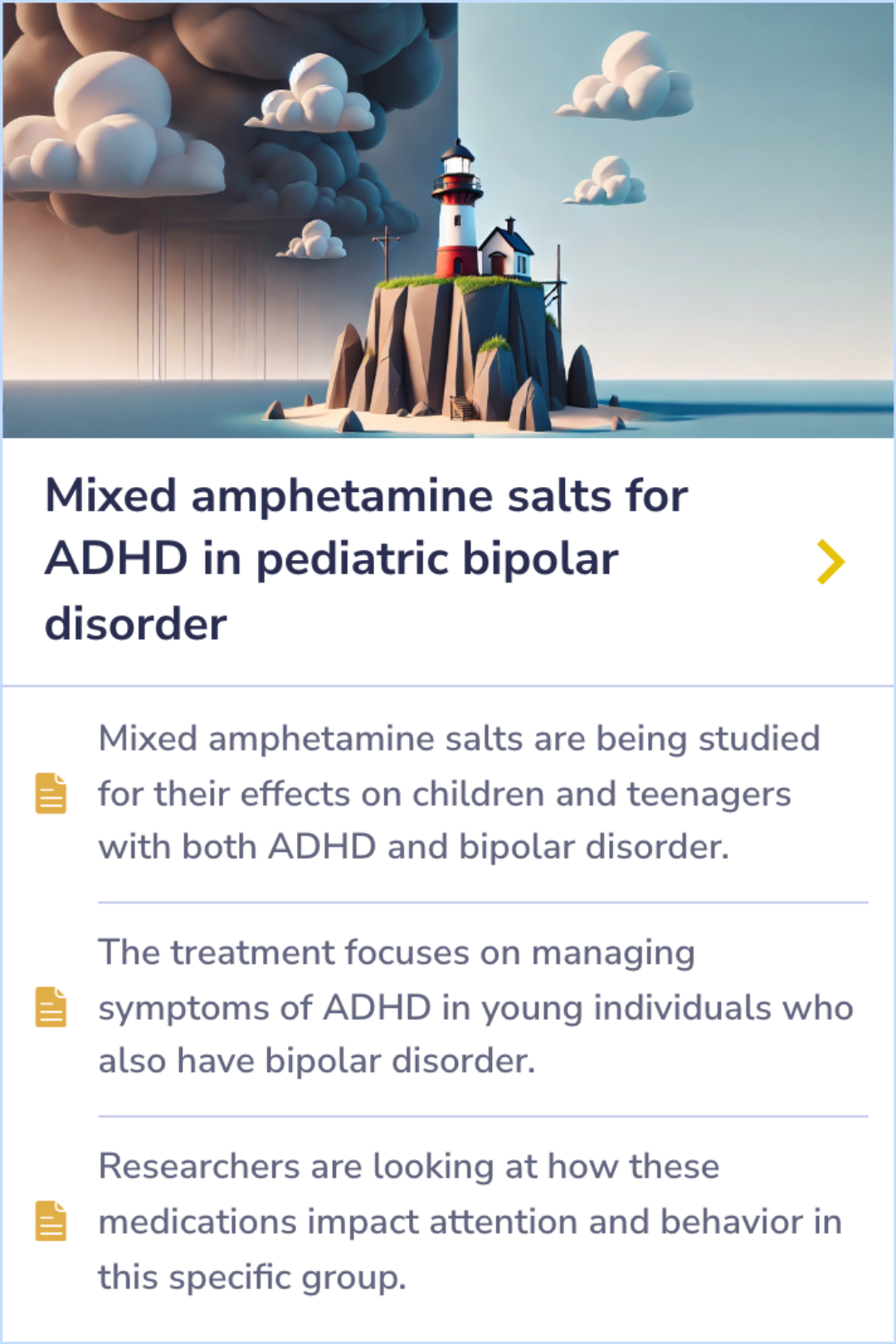Adderall Study Database
Visual Abstract
Cardiac safety of methylphenidate versus amphetamine salts in the treatment of ADHD
Cardiac safety of ADHD treatments
September 12, 2024
author
Winterstein AG, Gerhard T, Shuster J, Saidi A
journal
Pediatrics
Date Published
July 2009
Why link to a visual abstract?
What is a visual abstract?
Original
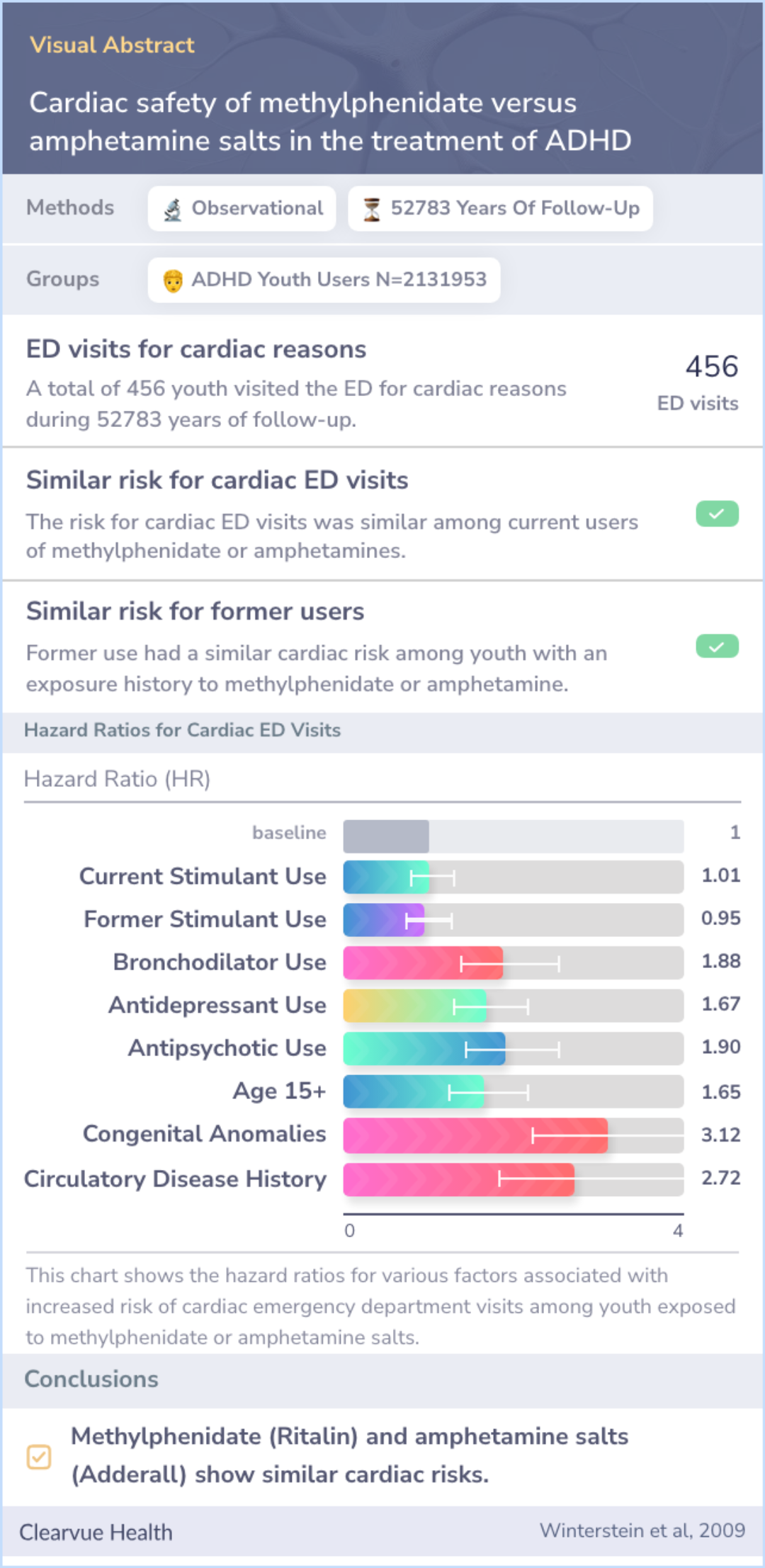
Study Summary
🔬
What They Studied
The researchers aimed to compare the risk for cardiac events in users of methylphenidate (Ritalin) and amphetamine salts (Adderall) for treating ADHD.
💡
What They Found
The study found that the risk for cardiac emergency department visits was similar among current users of methylphenidate (Ritalin) and amphetamine salts (Adderall).
📚
What This Means
The findings align with current evidence suggesting that both methylphenidate (Ritalin) and amphetamine salts (Adderall) have similar cardiac risk profiles when used for ADHD treatment.
Study Summary
Study Overview
Concerns about amphetamines causing serious heart issues were not confirmed in this study.
No significant risk difference was found between amphetamines and methylphenidate.
The study focused on cardiac symptoms and did not establish a link between drug type and serious events.
Patient response often guides medication use, reflecting possible changes in treatment related to early signs of heart issues.
FDA guidelines caution about potential cardiovascular risks and psychiatric symptoms from these drugs.
However, no large studies directly compare the heart-related risks of methylphenidate and amphetamines, highlighting a gap in existing data.
No significant risk difference was found between amphetamines and methylphenidate.
The study focused on cardiac symptoms and did not establish a link between drug type and serious events.
Patient response often guides medication use, reflecting possible changes in treatment related to early signs of heart issues.
FDA guidelines caution about potential cardiovascular risks and psychiatric symptoms from these drugs.
However, no large studies directly compare the heart-related risks of methylphenidate and amphetamines, highlighting a gap in existing data.
Abstract: background
Safety concerns about central nervous system stimulants for the treatment of attention-deficit/hyperactivity disorder (ADHD) include adverse cardiac effects. This study aimed to compare the risk for cardiac events in users of methylphenidate and amph...more

Study's Objective
"This study aimed to compare the risk for adverse cardiac events in users of methylphenidate and amphetamine salts."
Cardiac Risk Assessment
"Concerns that amphetamines might have a larger propensity to cause cardiac adverse events could not be confirmed in this study."
No Significant Difference
"The type of stimulant as evaluated in this study did not seem to affect the incidence of cardiac problems."
Study Summary
Methods
The researchers conducted a retrospective cohort study using data from Florida Medicaid, covering over 2 million children and adolescents. The study focused on those between the ages of 3 and 20 who had been diagnosed with ADHD and were newly prescribed either methylphenidate (Ritalin) or amphetamine salts (Adderall).
Each month of the study period, participants were categorized based on whether they were currently using or had previously used these medications. Cardiac events were identified as the first emergency department visit for heart-related symptoms or conditions. The analysis adjusted for various factors, including age, gender, race, underlying health conditions, and use of other medications, using a time-dependent Cox proportional hazard model to compare the risk of cardiac events between the two stimulant groups.
Each month of the study period, participants were categorized based on whether they were currently using or had previously used these medications. Cardiac events were identified as the first emergency department visit for heart-related symptoms or conditions. The analysis adjusted for various factors, including age, gender, race, underlying health conditions, and use of other medications, using a time-dependent Cox proportional hazard model to compare the risk of cardiac events between the two stimulant groups.
Abstract: methods
A retrospective cohort design using claims data from the Florida Medicaid fee-for-service program representing a total of 2131953 children and adolescents was used. The analysis included all beneficiaries who were between 3 and 20 years of age, enrol...more

Study Summary
Results
During the study period, 456 young people visited the emergency department for cardiac issues over a follow-up period totaling 52,783 years. After accounting for differences in health and demographic factors, the study found no significant difference in the risk of cardiac-related emergency visits between those currently using methylphenidate (Ritalin) and those using amphetamine salts (Adderall).
Additionally, former users of either medication showed a similar risk for cardiac events as those currently using them, indicating that stopping these medications didn’t appear to reduce cardiac risk. The findings suggest that the risk of heart-related emergencies is comparable between these two commonly prescribed ADHD treatments.
Additionally, former users of either medication showed a similar risk for cardiac events as those currently using them, indicating that stopping these medications didn’t appear to reduce cardiac risk. The findings suggest that the risk of heart-related emergencies is comparable between these two commonly prescribed ADHD treatments.
Abstract: results
A total of 456 youth visited the ED for cardiac reasons during 52783 years of follow-up. After adjustment for differences in covariates, the risk for cardiac ED visits was similar among current users of methylphenidate or amphetamines. Periods of for...more
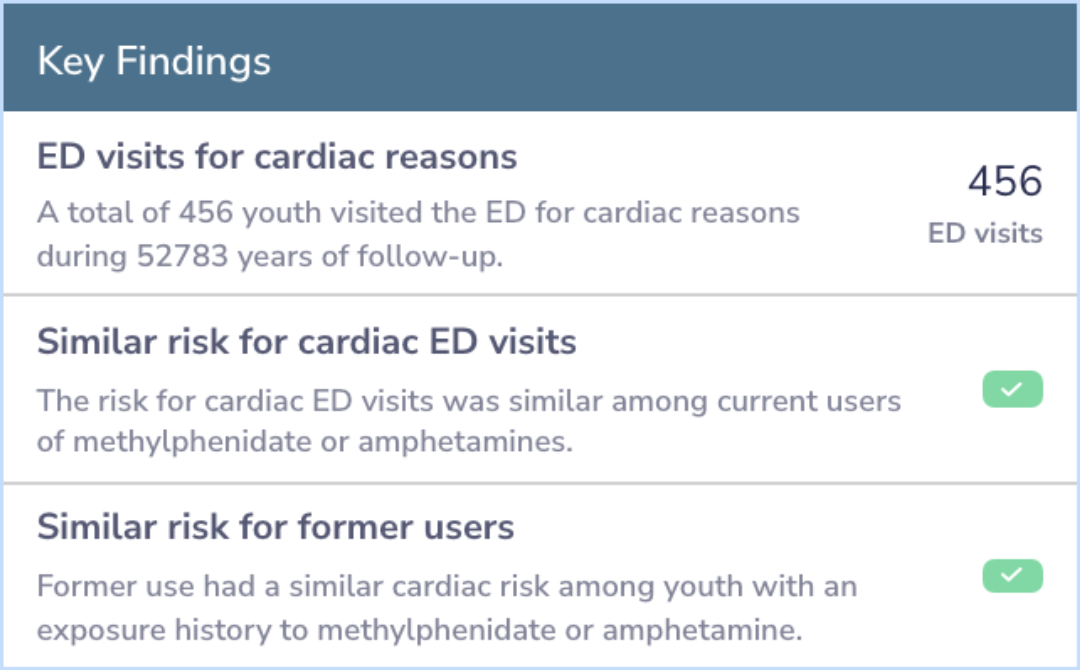
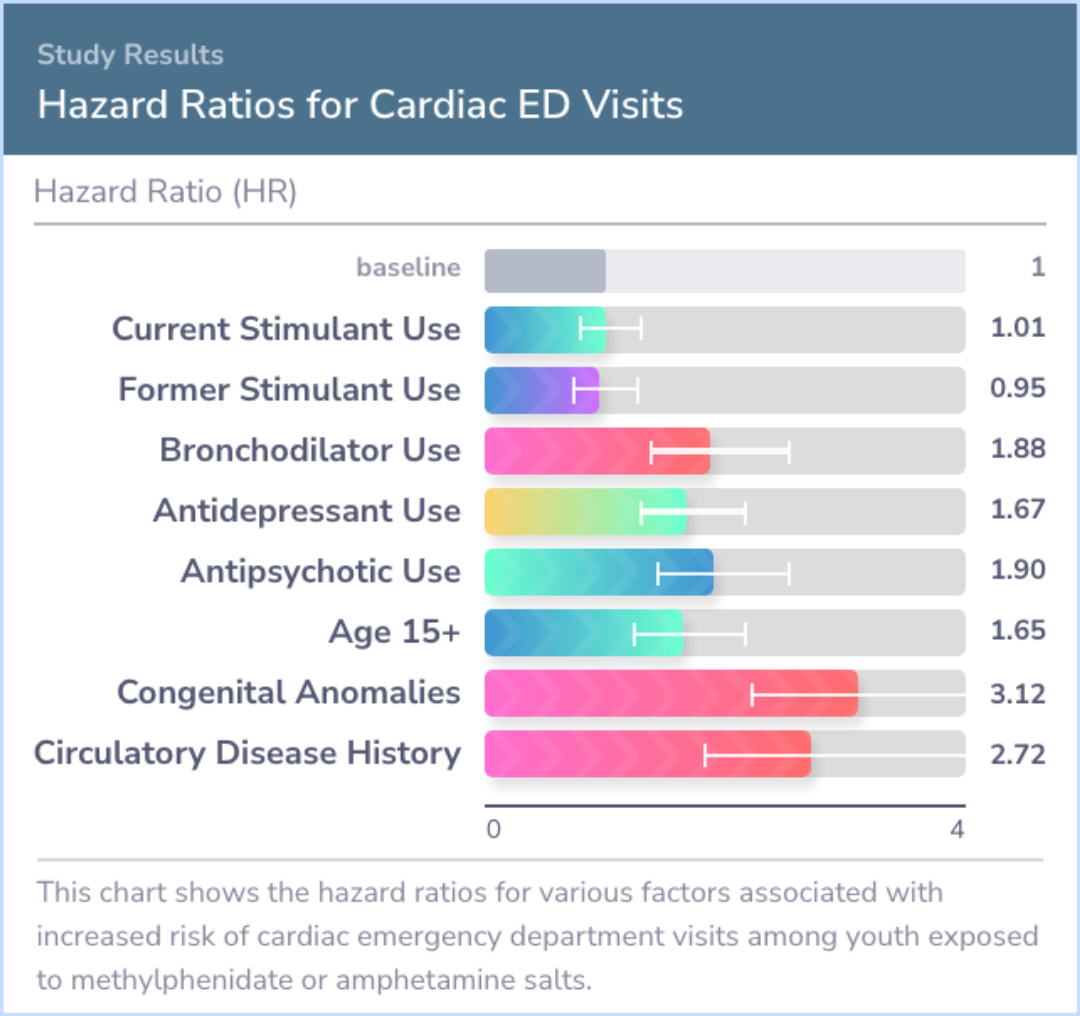
Study Summary
Conclusions
The study concluded that the risk of emergency department visits for cardiac issues is similar between young people using methylphenidate (Ritalin) and those using amphetamine salts (Adderall). This finding suggests that both medications carry a comparable risk of cardiac events. However, the researchers emphasize the need for more studies to explore the long-term effects, dosage differences, and how these medications might interact with pre-existing heart conditions.
Further research is needed to better understand the potential cardiac risks, especially as these medications are commonly prescribed for ADHD in young populations. This information could help healthcare providers make more informed decisions when treating children and adolescents with ADHD.
Further research is needed to better understand the potential cardiac risks, especially as these medications are commonly prescribed for ADHD in young populations. This information could help healthcare providers make more informed decisions when treating children and adolescents with ADHD.
Abstract: conclusions
Exposure to methylphenidate and amphetamines salts showed similar risk for cardiac ED visits. Additional population-based studies that address manifestation of serious heart disease, especially after long-term use, dosage comparisons, and interaction...more
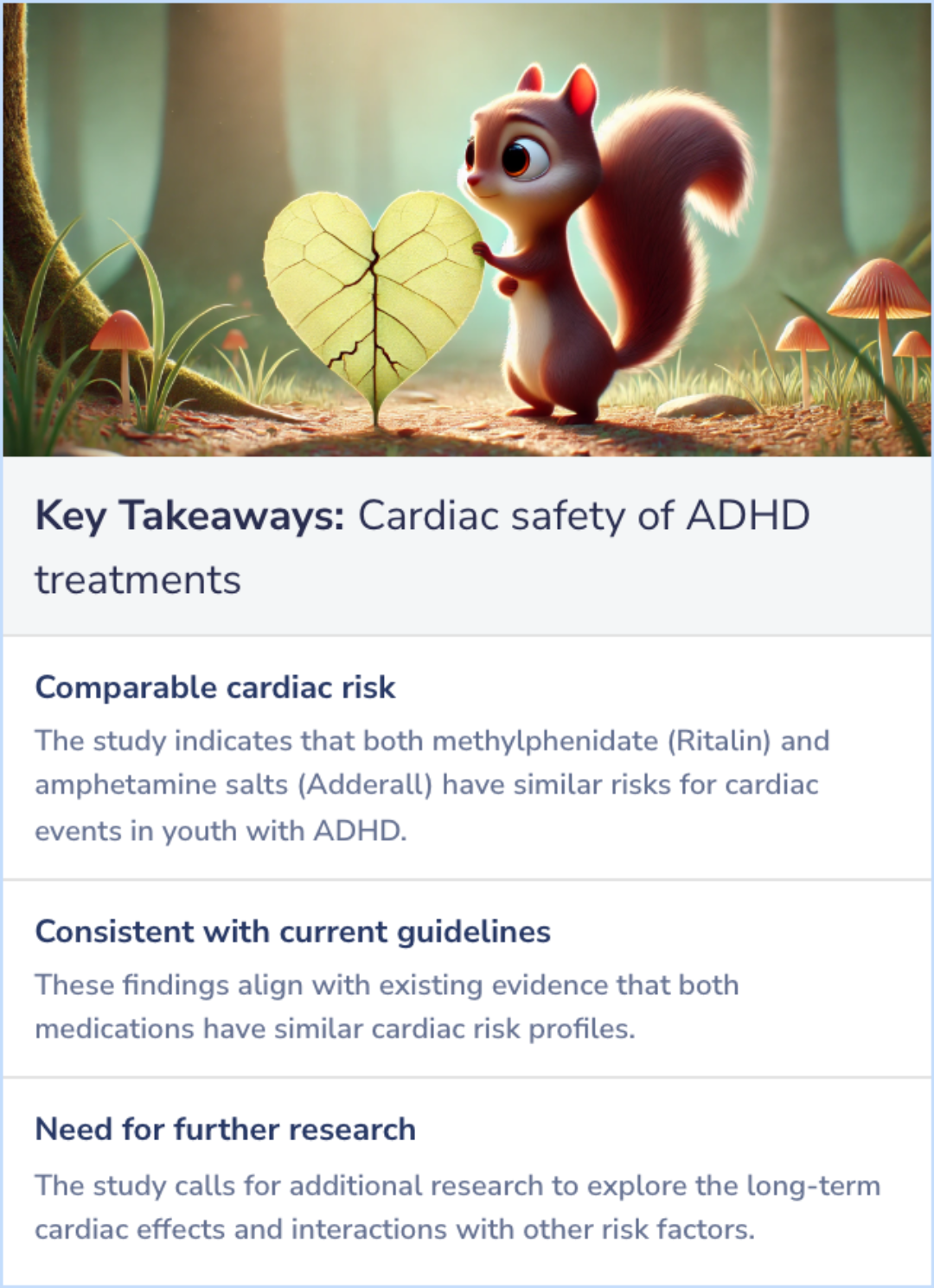
Background Information
Patient Guide
❤️
Methylphenidate Cardiovascular Risks
Can exacerbate heart symptoms like palpitations; not recommended for those with serious heart conditions.
❤️
Amphetamine Salts: Cardiovascular Concerns
Adderall may increase heart rate and blood pressure, with rare instances of severe cardiac events.
🧒
Age Considerations for Methylphenidate
Children must be six or older to be prescribed for ADHD treatment, highlighting importance in youth use.
🚫
Adderall Contraindicated with Heart Disease
Not advisable for patients with cardiovascular disease or hypertension due to increased heart risks.
👀
Side Effect Monitoring Mandates
Regular monitoring required for both drugs due to potential cardiovascular and psychiatric side effects.
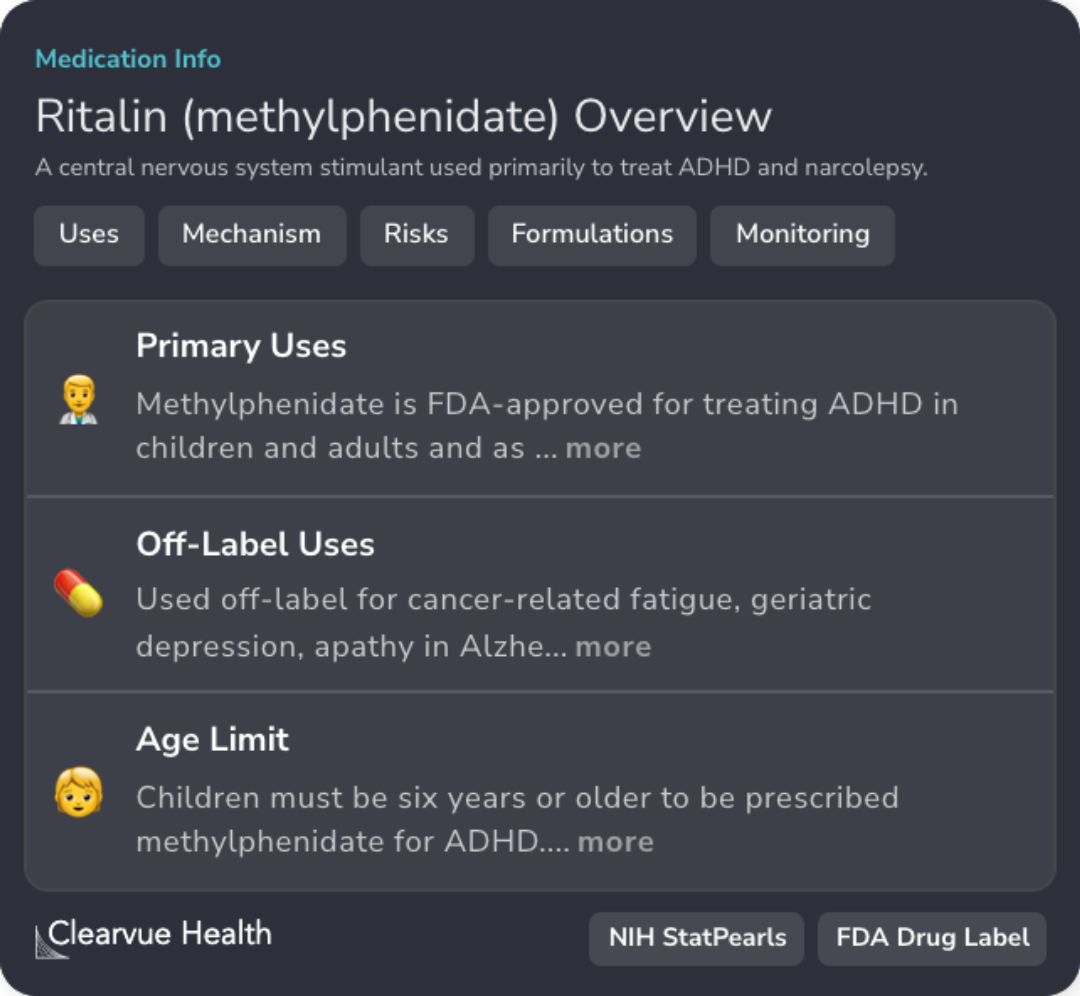
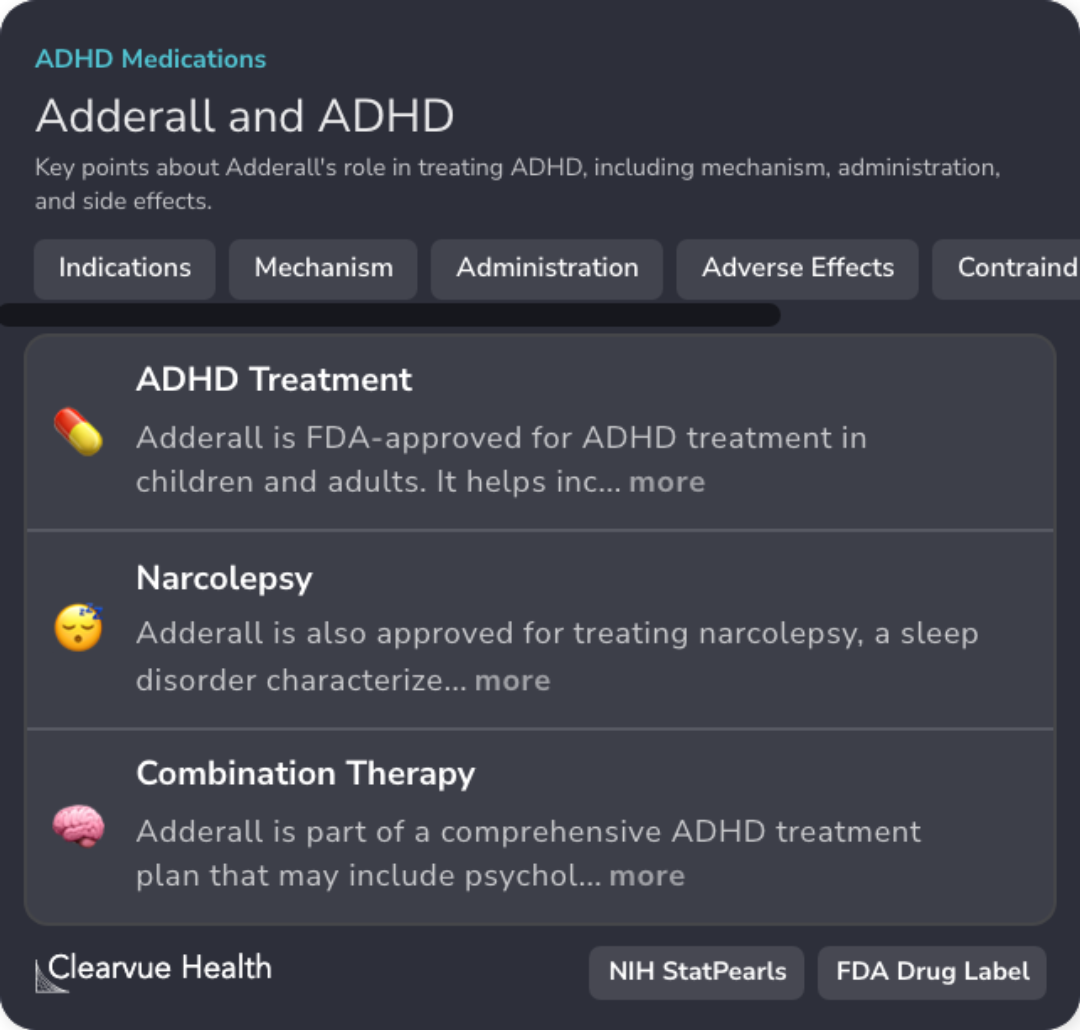
Professional Guide
Expert Opinion: Cardiac safety of ADHD treatments
In line with the study’s findings on cardiac risks associated with ADHD medication, current professional recommendations emphasize the importance of monitoring heart rate and blood pressure in patients using stimulants like methylphenidate and amphetamines. These medications can mildly increase these vital signs but have been linked to more significant changes in a subset of individuals, thus warranting vigilant clinical oversight.
Methylphenidate remains the recommended first-line treatment for preschool children due to limited research on alternatives, reinforcing its prominence in therapeutic guidelines.
The response to methylphenidate versus amphetamine varies greatly among patients, with no specific ADHD subtype predicting responsiveness, highlighting the need for individualized treatment plans.
Notably, while stimulant medications harbor a risk of cardiac events similar to those observed in the study, nonstimulants present a lower cardiovascular risk, providing a safer alternative for some patients. Research shows combining behavioral therapy with medication might enhance treatment outcomes, although its advantage over medication alone continues to be a subject of analysis.
Methylphenidate remains the recommended first-line treatment for preschool children due to limited research on alternatives, reinforcing its prominence in therapeutic guidelines.
The response to methylphenidate versus amphetamine varies greatly among patients, with no specific ADHD subtype predicting responsiveness, highlighting the need for individualized treatment plans.
Notably, while stimulant medications harbor a risk of cardiac events similar to those observed in the study, nonstimulants present a lower cardiovascular risk, providing a safer alternative for some patients. Research shows combining behavioral therapy with medication might enhance treatment outcomes, although its advantage over medication alone continues to be a subject of analysis.
Evidence Summary
Methylphenidate's Impact on Adult Heart Health
The article investigates methylphenidate's cardiovascular risks in adults treating ADHD. It delves into whether this common medication might affect heart health. Concerns revolve around potential cardiovascular risks associated with its use.
Examining existing research, the exploration aims at understanding how methylphenidate impacts heart health in adults, reviewing data to evaluate potential risks.
Examining existing research, the exploration aims at understanding how methylphenidate impacts heart health in adults, reviewing data to evaluate potential risks.
Evidence Summary
Enhancing ADHD Outcomes with Stimulant Therapy
Stimulant therapy plays a vital role in helping adolescents with ADHD by boosting their focus and attention, which can result in better academic achievements and improved social skills. This treatment option remains popular due to its effectiveness, and when administered by physicians, it ensures both safety and efficiency for young individuals.
Stimulant therapy is a commonly prescribed medication that fortifies teenagers' academic performance and social interactions under professional supervision.
Stimulant therapy is a commonly prescribed medication that fortifies teenagers' academic performance and social interactions under professional supervision.
Evidence Summary
Nuanced Insights into ADHD Treatment Comparisons
Explore how distinct aspects of ADHD treatment comparison bring nuanced insights. The data illustrates patterns and outcomes on varied parameters, shedding light on potential implications.
Intricate comparisons draw connections between different user groups, highlighting similarities and differences in responses. This nuanced glance helps contextualize findings within the broader study scope.
Intricate comparisons draw connections between different user groups, highlighting similarities and differences in responses. This nuanced glance helps contextualize findings within the broader study scope.
